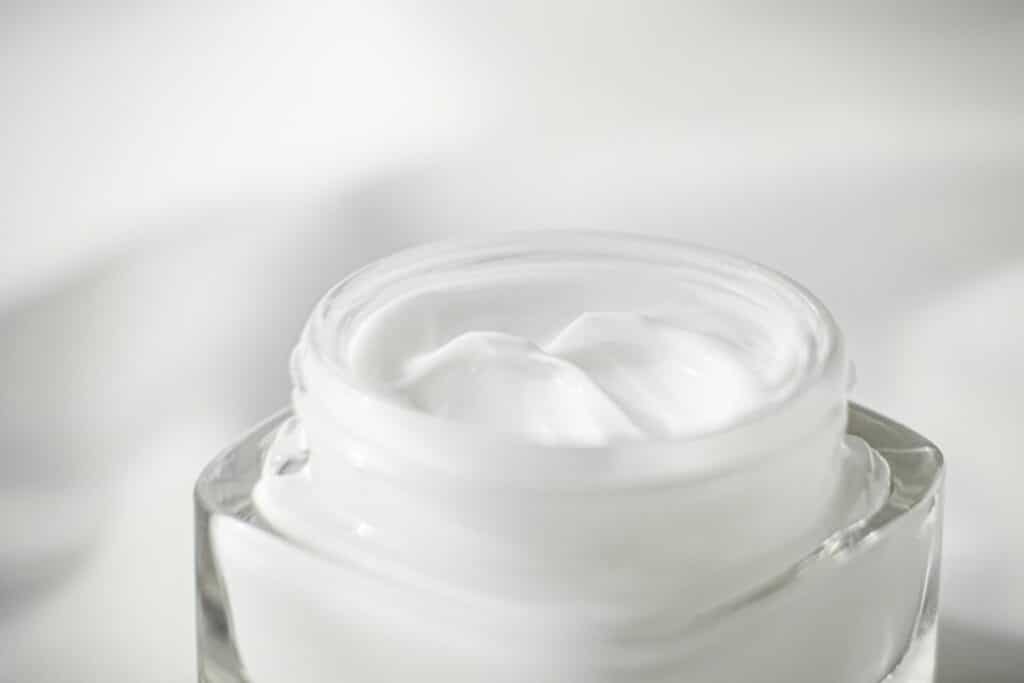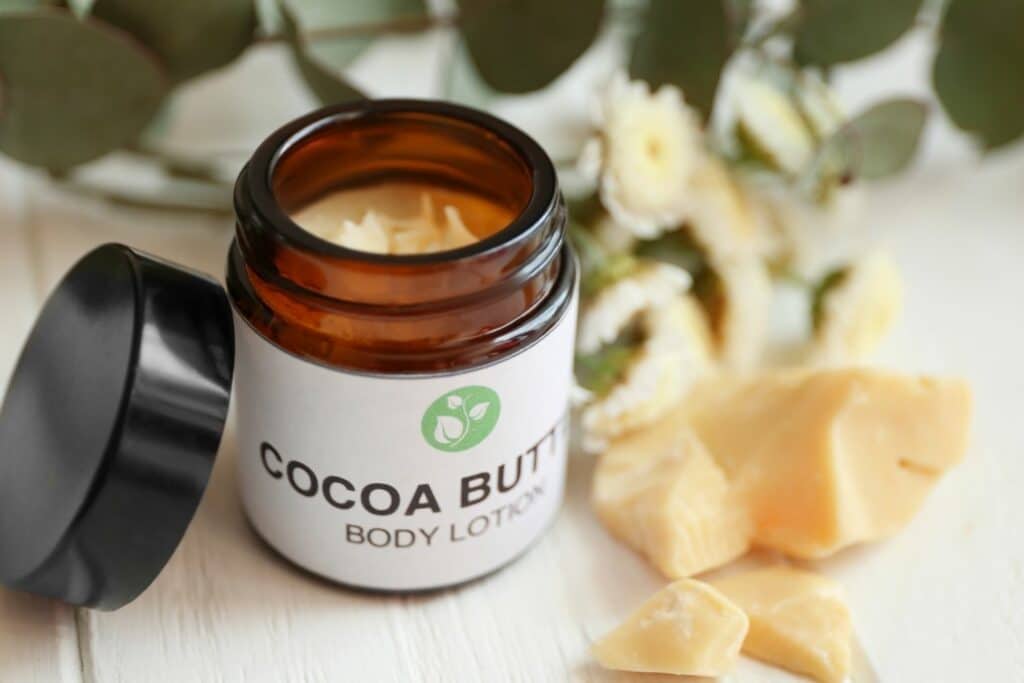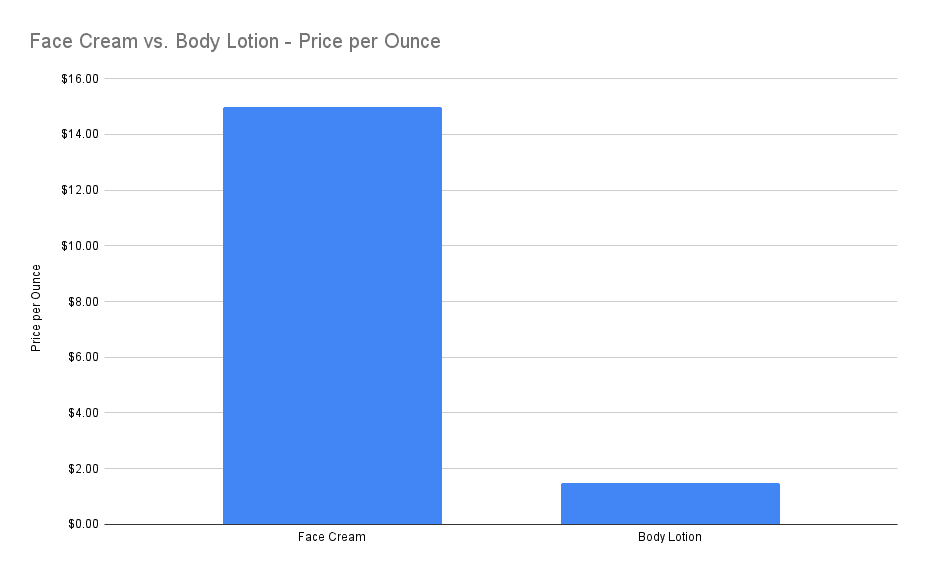In one hand, you have a face cream that costs you a pretty penny. In the other hand, you have your body lotion that’s more budget-friendly. Both are sitting there in their containers, staring at you, tempting you to use them interchangeably. But is it really a good idea?
While technically, you can use face cream on your body, the results may not be as effective as using a body lotion or cream. This is because face creams are not typically made to hydrate and nourish the skin on your body the way a body lotion is.
Summary
Here’s a table comparison between both face creams and body lotions:
| Attribute | Face Cream | Body Lotion |
|---|---|---|
| Viscosity | Thinner | Thicker |
| Targeted Ingredients | Contains ingredients to alleviate fine lines, wrinkles, dark spots, and other targeted solutions. | Generally focuses on moisture and hydration to the skin. |
| Absorption | Fast | Medium to slow |
| Price per Ounce | Averages $15 per ounce | Averages $1.50 per ounce |
What’s In Face Cream?

The primary purpose of face cream is to hydrate and nourish the delicate skin on your face. For this reason, face creams typically contain targeted ingredients that work to resolve specific skin concerns like dryness, dullness, and wrinkles.
Common face cream ingredients include:
- Glycerin: A natural humectant that helps draw moisture into the skin
- Hyaluronic acid: A substance that holds 1000x its weight in water, making it an extremely effective moisture-binding ingredient
- Niacinamide: A form of vitamin B3 that brightens skin and reduces the appearance of wrinkles
- Peptides: Short chains of amino acids that help promote collagen production
- Toners: Astringent liquids used to cleanse and tighten pores.
What’s In Body Lotion?

Body lotions are designed to hydrate and nourish the thick skin on your body. The skin on your body can vary between 0.07mm and 0.15mm thick (source), with the thickest skin on your upper back.
Since the skin on your body is much thicker than the skin on your face, body lotions concentrate on moisture retention rather than aesthetic concerns like brightening or reducing the appearance of wrinkles.
Common body lotion ingredients include:
- Glycerin: A natural humectant that helps draw moisture into the skin
- Shea butter: A fat derived from the African shea tree rich in vitamins A and E. It’s often used as a natural alternative to petroleum-based moisturizers
- Coconut oil: Another natural fat with moisture-locking properties
- Aloe vera: A plant with anti-inflammatory properties that can help soothe dry, irritated skin
Fundamentally Different
Face creams and body lotions are made with different skin types and uses in mind. More often than not, for the skin on your face, you are either trying to add moisture or reduce the appearance of fine lines, dark circles, puffiness, etc. With body lotions, you are trying to maintain moisture in order to prevent dryness, cracking, and other skin problems.
for your skin. So, if you’re looking to hydrate and nourish your skin, stick to using face cream and body lotion on your body.
From a Price per Ounce Analysis, Face Cream is More Expensive
Generally speaking, face cream costs more per ounce than body lotion. We found the average price per ounce to be $14.97. Whereas with body lotions, the average price per ounce was only $1.49, a significant difference.
Here’s a chart comparing the two:

Using face cream on your body means you’ll go through the product much faster, which means you’ll spend more in the long run.
Of course, using face cream on your body can work if you are in a pinch or perhaps traveling and looking to carry fewer products with you.
Consistency is Different Between the Two
If you have ever used face lotion and body lotion side-by-side, you may have noticed that they have different textures and consistencies.
Face creams tend to run a bit thinner than body lotions. They are also generally more smooth and creamy in texture. This consistency is necessary for face creams so that they can be easily absorbed into the skin without leaving behind a greasy residue.
Body lotions, on the other hand, are thicker and more viscous. This thicker consistency is necessary to coat and protect the thicker skin on your body.
What About those 3-in-1 Moisturizers?
Some guys like to use one product for their whole body to save time and money – and that’s completely understandable. But it’s important to understand that just because a product is marketed as a “3-in-1” doesn’t mean it will actually work well for all three purposes.
For example, one popular “3-in-1” product is Nivea’s Maximum Hydration Body Lotion. This product is designed to be on the face, body, and hands. But if we look at the ingredients, we can see that it’s primarily a body lotion with some added fragrance.
It lacks many effective ingredients in face creams, such as hyaluronic acid, retinol, and other botanical extracts. Meaning it will only do a sub-par job when it comes to performance.
So if you’re looking for a product that will work well for your face, body, and hands, you may want to consider investing in separate products for each area.
If You Use Face Lotion on Your Body, Consider This
Here are a few things to consider if you do decide to use face cream on your body:
Face Creams with Retinol Must be Carefully Applied
Many anti-aging face creams contain retinol (vitamin A), an ingredient that can help diminish the appearance of wrinkles and fine lines. However, retinol can also make your skin more sensitive to the sun.
If you decide to use face cream on your body, apply sunscreen afterward since you will be more susceptible to sunburn.
Dewy Appearance
Some face creams can provide a dewy appearance, which may not be the look you are going for your body. This may not be an issue if you have dry skin, but if you have oily skin, this glow may be more pronounced.
Face Creams May Not be as Nourishing
While face creams can be beneficial for your skin, they are not typically as nourishing as body lotions. This is because body lotions often contain ingredients like shea butter, cocoa butter, or coconut oil to help nourish and moisturize your skin.
Conclusion
So, can you use face cream on your body? Yes, but should you? Probably not. Face cream is more expensive per ounce than body lotion, and will often lead to poor results when used on your body.